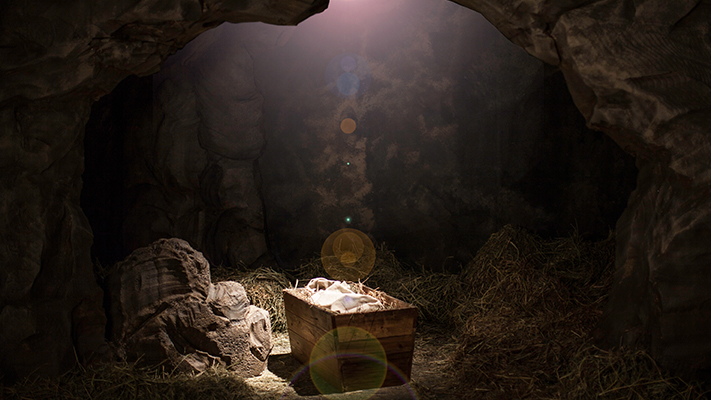 |
Paul E. Zell
For many congregations, the Gospel of the Day is the keynote for each worship service. The Gospel for Christmas Day is John 1:1-4. Based on that reading, the heading for the service might be “the Incarnation of our Lord” as the evangelist declares that God’s one and only Son, the eternal Word, became flesh. (The word incarnation draws from the Latin for “the act of being made flesh.”)
The identity of Jesus Christ is of critical importance to all who call on his name. It comes as no surprise, then, when the devil prompts false teachers to attack it. Believers must be prepared to proclaim the truth and defend it.
Only seemed to be a man?
For instance, some have taught that Jesus Christ only seemed to be a man. They will say that his body was that of a phantom, that his suffering was more theater than reality.
Read Hebrews 2:14-18.
- Which phrases indicate that God’s Son truly and fully became a human being?
- Christian doctrine is always practical. The writer mentions at least four practical outcomes of the Son of God’s incarnation. Underline them in your Bible.
- Recall at least three instances in the ministry of Jesus that give evidence to his being fully God.
- Recall at least three instances in the ministry of Jesus that give evidence to his being fully human.
A symbolic testimony?
Some scholars have asserted that a virgin birth is biologically impossible. It would not pass the test of scientific inquiry, and it must be regarded as a “symbolic” testimony to the Christian message.
Read both Matthew 1:18-25 and Luke 1:26-38.
- Which verses proclaim the virgin birth of Jesus as real fact?
- What Old Testament prophecy was fulfilled by this event?
- How do Joseph’s and Mary’s reactions to the angel’s words set the tone for the way God’s people today will respond to the doctrine of the virgin birth?
- What announcements elsewhere in Scripture refute the allegation that certain statements in the Bible are impossible because they do not adhere to the laws of nature?
Only God?
The church at Colosse came under attack from false teachers who felt that all matter is evil. Since the Son of God is good, they said, he could not have become an actual flesh-and-blood human being.
Read Colossians 1:15-20 and 2:9-12.
- The fact that Jesus is fully God could not be more obvious. Where, however, does the apostle also point to his human nature?
- What is one of the practical outcomes of this God-man’s work?
- Colossians 2:9 is a brief and bold statement of the two natures of Christ. Glance through what follows. By what means have you been joined to him and his bodily resurrection from the dead?
As true man, Jesus lived under the demands of God’s law without sinning. As true man, he shed his blood and died, redeeming sinners from death and hell. As true God, his obedience to God’s law and his substitutionary death count for all human beings. It’s no wonder that angels mark the incarnation of the Son of God with reverent and joyful worship. As do we. “Glory to God in the highest!”
For further reading
The Athanasian Creed (pp. 132,133 in Christian Worship)
The People’s Bible: John by Gary Baumler. See especially pp. 6-22. Available from Northwestern Publishing House, nph.net.
Author: Paul E. Zell
Volume 106, Number 12
Issue: December 2019
- Psalm 103: When you count your blessings
- Psalm 91: When God lifts you up on his lap
- Psalm 4: When you draw nearer to the end
- Psalm 42: When you ask, “Where is God when I’m hurting?”
- Psalm 32: When you need forgiveness
- Psalm 130: When rocks fall
- Bible study: Freedom in service
- What does this mean for me? Article 6
- Bible study: Spiritual gifts
- What does this mean for me? Article 5
- What does this mean for me? Article 4
- Bible study: Rejoice in your status!
- Bible study: Baptismal blessings
- What does this mean for me? Article 3
- What does this mean for me? Article 2
- Bible study: Gifts of tongues and miraculous healing
- What does this mean for me? Article 1
- Bible study: Jesus is everyone’s Savior
- Bible study: Love one another
- Bible study: Above all things!
- Bible study: The comfort of God’s providence
- The book of James: Waiting for Christ’s return
- Bible study: Precious grace
- The book of James: Active in using prayer
- Bible study: Rewards of grace
- The book of James: Active in showing love
- The book of James: Correctly evaluating riches
- Bible study: What’s going to happen on the Last Day?
- The book of James: Avoiding loveless judging
- Bible study: Interpretation practice
- The book of James: Taming the tongue
- Bible study: The Bible’s attributes
- Bible study: The importance of the family altar
- Bible study: God’s attitude is grace
- Bible study: The Bible’s account of Easter morning
- Bible study: Different types of sin
- Bible study: God’s inspiration
- Bible study: Giving God glory
- Bible study: Judge for yourself
- The book of James: Using the Word of Truth
- Bible study: The need for the Bible and worship
- Bible study: Citizens of two kingdoms
- The book of James: Active in good works
- The book of James: When battling temptation
- Bible study: God cares
- Bible study: God made the world
- The book of James: When facing trials
- Bible study: A loving God saved people from hell
- The book of James: A blueprint for living out our life of faith
- A Bible story just for me: Guilt
- Bible study: God provides victory over death!
- A Bible story just for me: Anxiety
- Bible study: God forgives and refuses to remember our sins
- A Bible story just for me: Grief
- Bible study: God helps those who cannot help themselves
- A Bible story just for me: Depression
- Bible study: God has not grown soft on sin
- Bible study: Only one path leads to God’s presence
- A Bible story just for me: Trauma
- A Bible story just for me
- Bible study: God wants me in heaven
- Bible study: The incarnation of our Lord






